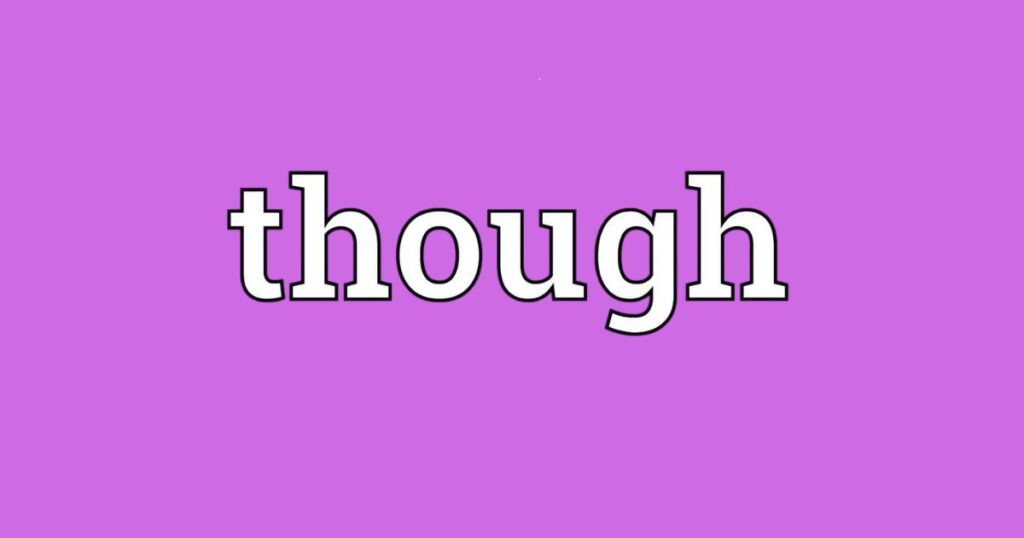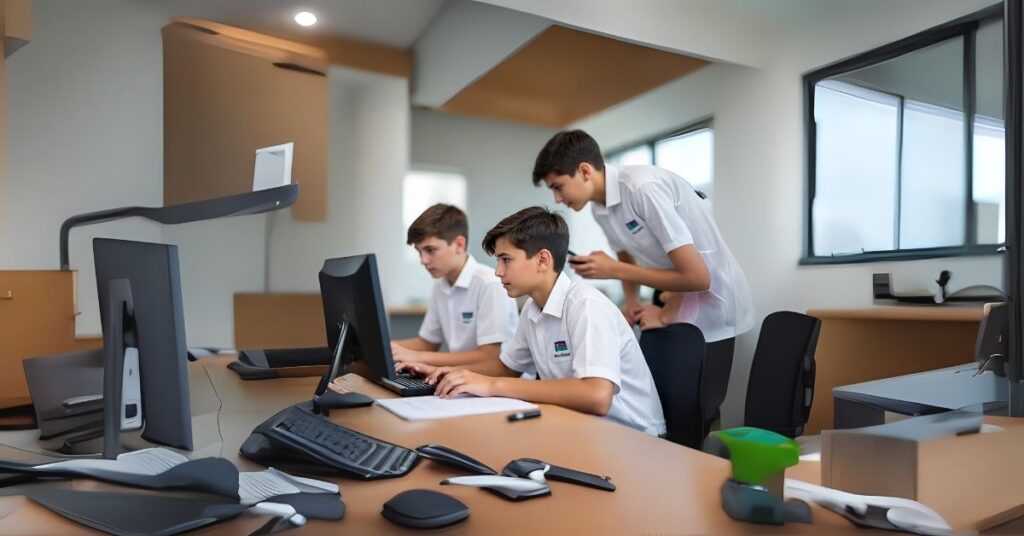Want to spice up your writing and sound more natural? Start by swapping out the phrase “even though” with some fresh alternatives! This simple phrase is often used to show contrast between two ideas, like “I went for a walk even though it was raining.” It highlights something unexpected happening despite another fact.
But why stick with just “even though”? You can mix it up with phrases like “although,” “though,” or “despite the fact that.” Using these alternatives can add variety and keep your writing from feeling repetitive. By showcasing contrasting ideas, you’ll make your sentences more dynamic and engaging. So, next time you’re writing, give “even though” a twist and try one of these options to make your point even clearer.
Other Ways to Say “Even Though”
“Even though” is commonly used to show contrast between two ideas. Alternatives include “although,” “though,” “despite the fact that,” “in spite of,” and “yet.” These phrases help convey opposing viewpoints, add nuance, and create balance in sentences, enhancing clarity and improving the overall flow of written or spoken communication.
1. Although
Example: “Although it was late, she decided to stay and finish her work.”
Meaning: Although is a conjunction that introduces a subordinate clause, presenting information that contrasts with or contradicts the main clause. It shows a logical contrast where the second clause presents an action that defies expectations set by the first.
Usage: Used to create contrast or a contradiction between two facts. It’s common in written English and academic tone writing for expressing nuanced language or unexpected results.
2. Though

Example: “The movie was long, though it was quite entertaining.”
Meaning: Though is similar to although but often used in a more informal expression. It introduces a subordinate clause that contrasts with or adds a nuance to the main clause. It creates a contrast without necessarily negating the first part of the sentence.
Usage: It can be used to introduce contrasting ideas in spoken English or informal writing, making it ideal for conversational tone.
3. Whereas
Example: “John enjoys outdoor activities, whereas his brother prefers staying indoors.”
Meaning: Whereas is a coordinating conjunction used to introduce a contrast between two facts, conditions, or ideas. It emphasizes the opposing viewpoints or logical contrast between two statements.
Usage: This is particularly useful in formal documents or scholarly writing, especially when drawing clear comparisons or introducing contrasting ideas in an academic tone.
4. While
Example: “While I understand your concern, I don’t agree with your approach.”
Meaning: While can introduce a contrast between two clauses, often suggesting opposing viewpoints or nuanced differences. It’s a flexible conjunction that can also be used to imply a simultaneous action, though in this case it’s emphasizing contrast.
Usage: In academic tone, formal writing, or even in creative writing, it helps in creating complex sentences that flow naturally, offering a clear sentence structure while introducing a subordinate clause.
5. Nevertheless
Example: “The hike was exhausting; nevertheless, we made it to the top.”
Meaning: Nevertheless is an adversative conjunction used to introduce a statement that contrasts with the previous one, but doesn’t diminish the overall impact. It emphasizes that despite an obstacle or problem, the result is still true or valid.
Usage: Often used to create an emphasis on contrast or an unexpected outcome in more formal expression or scholarly writing.
6. Despite the fact that
Example: “Despite the fact that it was raining, they continued their picnic.”
Meaning: Despite the fact that introduces a subordinate clause with a clear contrast between the expected and actual outcome. It emphasizes the unexpected result or action taken in spite of circumstances.
Usage: This phrase is useful in formal writing or academic tone, especially when describing situations where one thing happens contrary to what is expected.
7. In spite of the fact that
Example: “In spite of the fact that she was tired, she finished the project ahead of schedule.”
Meaning: Similar to despite the fact that, this conjunction introduces a contrast between two actions, where the second action is unexpected given the first.
Usage: Common in scholarly writing or formal expression, it provides a nuanced language choice that can make the writing sound more sophisticated.
8. Albeit
Example: “The proposal was accepted, albeit with several revisions.”
Meaning: Albeit is a more formal and somewhat archaic conjunction used to introduce a contrastive clause, emphasizing a subtle difference or limitation. It’s often used to reduce the weight of the first clause in a nuanced way.
Usage: Typically seen in literary writing or formal documents, it provides an alternative phrasing for expressing contrast without disrupting the flow of the sentence.
9. Yet
Example: “The plan was ambitious, yet it was well thought out.”
Meaning: Yet functions as a coordinating conjunction that contrasts two clauses, often showing a contradiction or an unexpected result. It indicates that despite one thing, the other is also true.
Usage: It’s used in both spoken and written English, though it may sound more formal in academic writing. It creates a logical contrast between two related ideas.
Read More: 12 Other Ways to Say “Furthermore”
10. However
Example: “The new policy is effective; however, its implementation has faced some challenges.”
Meaning: However is one of the most versatile transitional phrases used to show contrast, providing a logical contrast between two statements. It can introduce an unexpected outcome or a contradiction to the first clause.
Usage: Common in formal writing, especially in scholarly writing or legal documents, however creates a formal tone and is often used to introduce an alternative viewpoint.
11. On the other hand
Example: “She enjoys hiking, on the other hand, he prefers cycling.”
Meaning: On the other hand is a transitional phrase used to introduce an opposite scenario or contrasting viewpoint, emphasizing an alternative perspective or choice.
Usage: Frequently used in spoken English and informal writing, it’s a great way to present contrasting ideas or alternative phrasing in a conversational tone.
12. Conversely
Example: “The first option is more expensive; conversely, the second option offers greater value.”
Meaning: Conversely is a transitional word that introduces a reverse or opposite scenario, highlighting a logical contrast or a subtle difference between two points.
Usage: It’s used in more formal writing, especially when presenting an alternative viewpoint or contradictory argument structure in scholarly writing.
When to use different expressions of “even though”
You can use different expressions of even though to add variety to your writing. For formal settings, try “despite the fact that” or “although.” In casual situations, “though” works well. Use even though for personal or conversational tone, while “whereas” fits contrasting ideas in academic writing.
Casual Settings
In casual settings, people generally use simpler and more conversational language. Here, the tone is more relaxed, and the conjunctions serve to create contrast or opposing viewpoints in a friendly, informal way.
- Although
Example: “Although I was tired, I still went out with friends.” - Though
Example: “That pizza was great, though it was a bit too spicy for me.” - Yet
Example: “I’ve never been to the beach, yet I love the sound of the ocean.” - On the other hand
Example: “I love hiking. On the other hand, I can’t stand camping.” - However
Example: “I wanted to go to the concert. However, it was sold out.” - In spite of the fact that
Example: “In spite of the fact that he was late, we still had a great time.” - Whereas
Example: “John loves the city, whereas Mary prefers the countryside.”
Formal Settings
In formal settings, language tends to be more structured, and the conjunctions used often reflect a more professional or polished tone. They are appropriate for business meetings, professional emails, or formal speeches.
- Although
Example: “Although the report was thorough, additional data was needed for clarity.” - Nevertheless
Example: “The proposal faced several challenges. Nevertheless, it was approved.” - Despite the fact that
Example: “Despite the fact that we disagreed, we reached a consensus.” - Albeit
Example: “The results were promising, albeit preliminary.” - Whereas
Example: “The company has seen a growth in sales, whereas competitors have stagnated.” - Yet
Example: “The decision was final, yet discussions continued.” - Conversely
Example: “The first option is cost-effective; conversely, the second option offers superior quality.”
Academic Settings
In academic settings, the tone is formal, and the language is structured to provide clarity and depth. Conjunctions are used to present logical contrasts, opposing viewpoints, or cause and effect relationships in research papers, essays, or lectures.
- Although
Example: “Although the theory has been widely accepted, recent studies suggest otherwise.” - However
Example: “The research is promising. However, further studies are needed to confirm the findings.” - In spite of the fact that
Example: “In spite of the fact that the data is inconclusive, the hypothesis remains viable.” - Yet
Example: “The experiment failed to produce expected results, yet it provided valuable insights.” - Whereas
Example: “Studies show significant improvement in cognitive function, whereas motor skills remain unchanged.” - Nevertheless
Example: “The argument is compelling. Nevertheless, it overlooks critical variables.” - Despite the fact that
Example: “Despite the fact that there was no prior evidence, the hypothesis held true in the final analysis.”
Literary or Creative Writing
In literary or creative writing, the focus is on expressive language and tone variation. Writers use conjunctions to develop contrastive relationships, nuanced language, and unexpected outcomes, often to engage the reader emotionally or to develop complex characters and plots.
- Although
Example: “Although the moon hung low in the sky, the air was thick with tension.” - Though
Example: “She smiled, though her heart felt heavy with doubt.” - Yet
Example: “The hero stood tall, yet the weight of his past seemed to pull him down.” - On the other hand
Example: “He longed for adventure, on the other hand, she feared the unknown.” - Nevertheless
Example: “They walked through the storm, nevertheless, their spirits remained unbroken.” - In spite of the fact that
Example: “In spite of the fact that they had no map, they continued to wander into the wilderness.” - Whereas
Example: “He sought redemption, whereas she found peace in solitude.”
Conclusion
In conclusion, using different ways to say “even though” can make your writing more exciting and varied. You don’t always have to use the same phrase. Alternatives like “although,” “though,” or “despite the fact that” are perfect substitutes. These phrases help you show contrast and add more depth to your writing.
Next time you write, remember that “even though” isn’t the only option. Experiment with these alternatives to keep your sentences fresh. By doing so, you can emphasize the contrast between ideas and make your message clearer. So, have fun with language, and don’t hesitate to try out new ways to say “even though”
FAQ’s
What is the meaning of Even Though?
Even Though is used to show contrast between two ideas. It highlights a surprising fact in light of something else.
What are some alternatives to Even Though?
You can use words like although, though, or despite the fact that. These alternatives convey a similar contrast, keeping your writing fresh and engaging.
Can Even Though be used at the start of a sentence?
Yes, Even Though can begin a sentence to introduce a contrasting idea. For example, Even Though it was cold, we went outside.
Are there formal and informal ways to use Even Though?
Yes, in formal settings, you can use despite the fact that. In informal situations, Even Though or though are more common and casual.
How can I improve my writing with Even Though?
Using Even Though in different ways can make your writing more dynamic. It helps show contrasting ideas and adds depth to your sentences.

Grammerroot is your trusted source for mastering English grammar and language skills. From simple rules to advanced tips, we help learners build strong foundations through easy-to-understand content. Learn smart, learn right — only at Grammer Root.




